- Home
- Patricia Highsmith
The Talented Mr. Ripley Page 2
The Talented Mr. Ripley Read online
Page 2
When he woke up the next morning Bob was not there, and Tom saw from a glance at his bed that he hadn’t come home. Tom jumped out of bed, went to the two-ring burner and put on coffee. Just as well Bob wasn’t home this morning. He didn’t want to tell Bob about the European trip. All that crummy bum would see in it was a free trip. And Ed Martin, too, probably, and Bert Visser, and all the other crumbs he knew. He wouldn’t tell any of them, and he wouldn’t have anybody seeing him off. Tom began to whistle. He was invited to dinner tonight at the Greenleafs’ apartment on Park Avenue.
Fifteen minutes later, showered, shaved, and dressed in a suit and a striped tie that he thought would look well in his passport photo, Tom was strolling up and down the room with a cup of black coffee in his hand, waiting for the morning mail. After the mail, he would go over to Radio City to take care of the passport business. What should he do this afternoon? Go to some art exhibits, so he could chat about them tonight with the Greenleafs? Do some research on Burke-Greenleaf Watercraft, Inc., so Mr. Greenleaf would know that he took an interest in his work?
The whack of the mailbox came faintly through the open window, and Tom went downstairs. He waited until the mailman was down the front steps and out of sight before he took the letter addressed to George McAlpin down from the edge of the mailbox frame where the mailman had stuck it. Tom ripped it open. Out came a check for one hundred and nineteen dollars and fifty-four cents, payable to the Collector of Internal Revenue. Good old Mrs. Edith W. Superaugh! Paid without a whimper, without even a telephone call. It was a good omen. He went upstairs again, tore up Mrs. Superaugh’s envelope and dropped it into the garbage bag.
He put her check into a manila envelope in the inside pocket of one of his jackets in the closet. This raised his total in checks to one thousand eight hundred and sixty-three dollars and fourteen cents, he calculated in his head. A pity that he couldn’t cash them. Or that some idiot hadn’t paid in cash yet, or made out a check to George McAlpin, but so far no one had. Tom had a bank messenger’s identification card that he had found somewhere with an old date on it that he could try to alter, but he was afraid he couldn’t get away with cashing the checks, even with a forged letter of authorization for whatever the sum was. So it amounted to no more than a practical joke, really. Good clean sport. He wasn’t stealing money from anybody. Before he went to Europe, he thought, he’d destroy the checks.
There were seven more prospects on his list. Shouldn’t he try just one more in these last ten days before he sailed? Walking home last evening, after seeing Mr. Greenleaf, he had thought that if Mrs. Superaugh and Carlos de Sevilla paid up, he’d call it quits. Mr. de Sevilla hadn’t paid up yet—he needed a good scare by telephone to put the fear of God into him, Tom thought—but Mrs. Superaugh had been so easy, he was tempted to try just one more.
Tom took a mauve-colored stationery box from his suitcase in the closet. There were a few sheets of stationery in the box, and below them a stack of various forms he had taken from the Internal Revenue office when he had worked there as a stockroom clerk a few weeks ago. On the very bottom was his list of prospects—carefully chosen people who lived in the Bronx or in Brooklyn and would not be too inclined to pay the New York office a personal visit, artists and writers and freelance people who had no withholding taxes, and who made from seven to twelve thousand a year. In that bracket, Tom figured that people seldom hired professional tax men to compute their taxes, while they earned enough money to be logically accused of having made a two- or three-hundred dollar error in their tax computations. There was William J. Slatterer, journalist; Philip Robillard, musician; Frieda Hoehn, illustrator; Joseph J. Gennari, photographer; Frederick Reddington, artist; Frances Karnegis—Tom had a hunch about Reddington. He was a comic-book artist. He probably didn’t know whether he was coming or going.
He chose two forms headed notice of error in computation, slipped a carbon between them, and began to copy rapidly the data below Reddington’s name on his list. Income: $11,250. Exemptions: 1. Deductions: $600. Credits: nil. Remittance: nil. Interest: (he hesitated a moment) $2.16. Balance due: $233.76. Then he took a piece of typewriter paper stamped with the Department of Internal Revenue’s Lexington Avenue address from his supply in his carbon folder, crossed out the address with one slanting line of his pen, and typed below it:
Dear Sir:
Due to an overflow at our regular Lexington Avenue office, your reply should be sent to:
Adjustment Department
Attention of George McAlpin
187 E. 51 Street
New York 22, New York.
Thank you.
Ralph F. Fischer
Gen. Dir. Adj. Dept.
Tom signed it with a scrolly, illegible signature. He put the other forms away in case Bob should come in suddenly, and picked up the telephone. He had decided to give Mr. Reddington a preliminary prod. He got Mr. Reddington’s number from information and called it. Mr. Reddington was at home. Tom explained the situation briefly, and expressed surprise that Mr. Reddington had not yet received the notice from the Adjustment Department.
“That should have gone out a few days ago,” Tom said. “You’ll undoubtedly get it tomorrow. We’ve been a little rushed around here.”
“But I’ve paid my tax,” said the alarmed voice at the other end. “They were all—”
“These things can happen, you know, when the income’s earned on a freelance basis with no withholding tax. We’ve been over your return very carefully, Mr. Reddington. There’s no mistake. And we wouldn’t like to slap a lien on the office you work for or your agent or whatever—” Here he chuckled. A friendly, personal chuckle generally worked wonders. “—but we’ll have to do that unless you pay within forty-eight hours. I’m sorry the notice hasn’t reached you before now. As I said, we’ve been pretty—”
“Is there anyone there I can talk to about it if I come in?” Mr. Reddington asked anxiously. “That’s a hell of a lot of money!”
“Well, there is, of course.” Tom’s voice always got folksy at this point. He sounded like a genial old codger of sixty-odd, who might be as patient as could be if Mr. Reddington came in, but who wouldn’t yield by so much as a red cent, for all the talking and explaining Mr. Reddington might do. George McAlpin represented the Tax Department of the United States of America, suh. “You can talk to me, of course,” Tom drawled, “but there’s absolutely no mistake about this, Mr. Reddington. I’m just thinking of saving you your time. You can come in if you want to, but I’ve got all your records right here in my hand.”
Silence. Mr. Reddington wasn’t going to ask him anything about records, because he probably didn’t know what to begin asking. But if Mr. Reddington were to ask him to explain what it was all about, Tom had a lot of hash about net income versus accrued income, balance due versus computation, interest at six percent per annum accruing from due date of the tax until paid on any balance which represents tax shown on original return, which he could deliver in a slow voice as incapable of interruption as a Sherman tank. So far, no one had insisted on coming in person to hear more of that. Mr. Reddington was backing down, too. Tom could hear it in the silence.
“All right,” Mr. Reddington said in a tone of collapse. “I’ll read the notice when I get it tomorrow.”
“All right, Mr. Reddington,” he said, and hung up.
Tom sat there for a moment, giggling, the palms of his thin hands pressed together between his knees. Then he jumped up, put Bob’s typewriter away again, combed his light-brown hair neatly in front of the mirror, and set off for Radio City.
3
“Hello-o, Tom, my boy!” Mr. Greenleaf said in a voice that promised good martinis, a gourmet’s dinner, and a bed for the night in case he got too tired to go home. “Emily, this is Tom Ripley!”
“I’m so happy to meet you!” she said warmly.
“How do you do, Mrs. Greenleaf?”
She was very much what he had expected—blonde, rather tall and slender, with
enough formality to keep him on his good behavior, yet with the same naïve goodwill-toward-all that Mr. Greenleaf had. Mr. Greenleaf led them into the living room. Yes, he had been here before with Dickie.
“Mr. Ripley’s in the insurance business,” Mr. Greenleaf announced, and Tom thought he must have had a few already, or he was very nervous tonight, because Tom had given him quite a description last night of the advertising agency where he had said he was working.
“Not a very exciting job,” Tom said modestly to Mrs. Greenleaf.
A maid came into the room with a tray of martinis and canapés.
“Mr. Ripley’s been here before,” Mr. Greenleaf said. “He’s come here with Richard.”
“Oh, has he? I don’t believe I met you, though.” She smiled. “Are you from New York?”
“No, I’m from Boston,” Tom said. That was true.
About thirty minutes later—just the right time later, Tom thought, because the Greenleafs had kept insisting that he drink another and another martini—they went into a dining room off the living room, where a table was set for three with candles, huge dark-blue dinner napkins, and a whole cold chicken in aspic. But first there was céleri rémoulade. Tom was very fond of it. He said so.
“So is Richard!” Mrs. Greenleaf said. “He always liked it the way our cook makes it. A pity you can’t take him some.”
“I’ll put it with the socks,” Tom said, smiling, and Mrs. Greenleaf laughed. She had told him she would like him to take Richard some black woolen socks from Brooks Brothers, the kind Richard always wore.
The conversation was dull, and the dinner superb. In answer to a question of Mrs. Greenleaf’s, Tom told her that he was working for an advertising firm called Rothenberg, Fleming, and Barter. When he referred to it again, he deliberately called it Reddington, Fleming, and Parker. Mr. Greenleaf didn’t seem to notice the difference. Tom mentioned the firm’s name the second time when he and Mr. Greenleaf were alone in the living room after dinner.
“Did you go to school in Boston?” Mr. Greenleaf asked.
“No, sir. I went to Princeton for a while, then I visited another aunt in Denver and went to college there.” Tom waited, hoping Mr. Greenleaf would ask him something about Princeton, but he didn’t. Tom could have discussed the system of teaching history, the campus restrictions, the atmosphere at the weekend dances, the political tendencies of the student body, anything. Tom had been very friendly last summer with a Princeton junior who had talked of nothing but Princeton, so that Tom had finally pumped him for more and more, foreseeing a time when he might be able to use the information. Tom had told the Greenleafs that he had been raised by his Aunt Dottie in Boston. She had taken him to Denver when he was sixteen, and actually he had only finished high school there, but there had been a young man named Don Mizell rooming in his Aunt Bea’s house in Denver who had been going to the University of Colorado. Tom felt as if he had gone there, too.
“Specialize in anything in particular?” Mr. Greenleaf asked.
“Sort of divided myself between accounting and English composition,” Tom replied with a smile, knowing it was such a dull answer that nobody would possibly pursue it.
Mrs. Greenleaf came in with a photograph album, and Tom sat beside her on the sofa while she turned through it. Richard taking his first step, Richard in a ghastly full-page color photograph dressed and posed as the Blue Boy, with long blond curls. The album was not interesting to him until Richard got to be sixteen or so, long-legged, slim, with the wave tightening in his hair. So far as Tom could see, he had hardly changed between sixteen and twenty-three or -four, when the pictures of him stopped, and it was astonishing to Tom how little the bright, naïve smile changed. Tom could not help feeling that Richard was not very intelligent, or else he loved to be photographed and thought he looked best with his mouth spread from ear to ear, which was not very intelligent of him, either.
“I haven’t gotten round to pasting these in yet,” Mrs. Greenleaf said, handing him a batch of loose pictures. “These are all from Europe.”
They were more interesting: Dickie in what looked like a café in Paris, Dickie on a beach. In several of them he was frowning.
“This is Mongibello, by the way,” Mrs. Greenleaf said, indicating the picture of Dickie pulling a rowboat up on the sand. The picture was backgrounded by dry, rocky mountains and a fringe of little white houses along the shore. “And here’s the girl there, the only other American who lives there.”
“Marge Sherwood,” Mr. Greenleaf supplied. He sat across the room, but he was leaning forward, following the picture-showing intently.
The girl was in a bathing suit on the beach, her arms around her knees, healthy and unsophisticated-looking, with tousled, short blonde hair—the good-egg type. There was a good picture of Richard in shorts, sitting on the parapet of a terrace. He was smiling, but it was not the same smile, Tom saw. Richard looked more poised in the European pictures.
Tom noticed that Mrs. Greenleaf was staring down at the rug in front of her. He remembered the moment at the table when she had said, “I wish I’d never heard of Europe!” and Mr. Greenleaf had given her an anxious glance and then smiled at him, as if such outbursts had occurred before. Now he saw tears in her eyes. Mr. Greenleaf was getting up to come to her.
“Mrs. Greenleaf,” Tom said gently, “I want you to know that I’ll do everything I can to make Dickie come back.”
“Bless you, Tom, bless you.” She pressed Tom’s hand that rested on his thigh.
“Emily, don’t you think it’s time you went in to bed?” Mr. Greenleaf asked, bending over her.
Tom stood up as Mrs. Greenleaf did.
“I hope you’ll come again to pay us a visit before you go, Tom,” she said. “Since Richard’s gone, we seldom have any young men to the house. I miss them.”
“I’d be delighted to come again,” Tom said.
Mr. Greenleaf went out of the room with her. Tom remained standing, his hands at his sides, his head high. In a large mirror on the wall he could see himself: the upright, self-respecting young man again. He looked quickly away. He was doing the right thing, behaving the right way. Yet he had a feeling of guilt. When he had said to Mrs. Greenleaf just now, I’ll do everything I can . . . Well, he meant it. He wasn’t trying to fool anybody.
He felt himself beginning to sweat, and he tried to relax. What was he so worried about? He’d felt so well tonight! When he had said that about Aunt Dottie—
Tom straightened, glancing at the door, but the door had not opened. That had been the only time tonight when he had felt uncomfortable, unreal, the way he might have felt if he had been lying, yet it had been practically the only thing he had said that was true: My parents died when I was very small. I was raised by my aunt in Boston.
Mr. Greenleaf came into the room. His figure seemed to pulsate and grow larger and larger. Tom blinked his eyes, feeling a sudden terror of him, an impulse to attack him before he was attacked.
“Suppose we sample some brandy?” Mr. Greenleaf said, opening a panel beside the fireplace.
It’s like a movie, Tom thought. In a minute, Mr. Greenleaf or somebody else’s voice would say, “Okay, cut!” and he would relax again and find himself back in Raoul’s with the gin and tonic in front of him. No, back in the Green Cage.
“Had enough?” Mr. Greenleaf asked. “Don’t drink this, if you don’t want it.”
Tom gave a vague nod, and Mr. Greenleaf looked puzzled for an instant, then poured the two brandies.
A cold fear was running over Tom’s body. He was thinking of the incident in the drugstore last week, though that was all over and he wasn’t really afraid, he reminded himself, not now. There was a drugstore on Second Avenue whose phone number he gave out to people who insisted on calling him again about their income tax. He gave it out as the phone number of the Adjustment Department where he could be reached only between three-thirty and four on Wednesday and Friday afternoons. At these times, Tom hung around the booth in the dru
gstore, waiting for the phone to ring. When the druggist had looked at him suspiciously the second time he had been there, Tom had said that he was waiting for a call from his girlfriend. Last Friday when he had answered the telephone, a man’s voice had said, “You know what we’re talking about, don’t you? We know where you live, if you want us to come to your place. . . . We’ve got the stuff for you, if you’ve got it for us.” An insistent yet evasive voice, so that Tom had thought it was some kind of a trick and hadn’t been able to answer anything. Then, “Listen, we’re coming right over. To your house.”
Tom’s legs had felt like jelly when he got out of the phone booth, and then he had seen the druggist staring at him, wide-eyed, panicky-looking, and the conversation had suddenly explained itself: the druggist sold dope, and he was afraid that Tom was a police detective who had come to get the goods on him. Tom had started laughing, had walked out laughing uproariously, staggering as he went, because his legs were still weak from his own fear.
“Thinking about Europe?” Mr. Greenleaf’s voice said.
Tom accepted the glass Mr. Greenleaf was holding out to him. “Yes, I was,” Tom said.
“Well, I hope you enjoy your trip, Tom, as well as have some effect on Richard. By the way, Emily likes you a lot. She told me so. I didn’t have to ask her.” Mr. Greenleaf rolled his brandy glass between his hands. “My wife has leukemia, Tom.”
“Oh. That’s very serious, isn’t it?”
“Yes. She may not live a year.”
“I’m sorry to hear that,” Tom said.
Mr. Greenleaf pulled a paper out of his pocket. “I’ve got a list of boats. I think the usual Cherbourg way is quickest, and also the most interesting. You’d take the boat train to Paris, then a sleeper down over the Alps to Rome and Naples.”

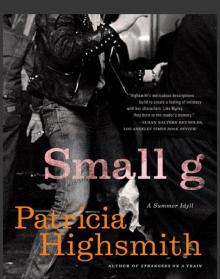 Small G: A Summer Idyll
Small G: A Summer Idyll The Boy Who Followed Ripley
The Boy Who Followed Ripley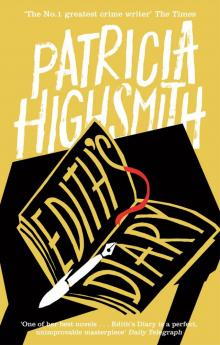 Edith's Diary
Edith's Diary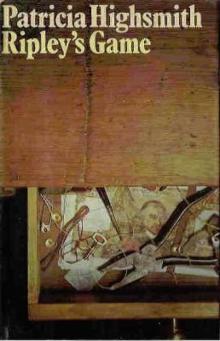 Ripley's Game
Ripley's Game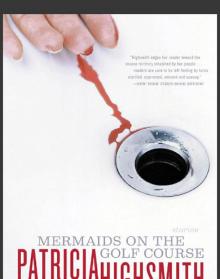 Mermaids on the Golf Course: Stories
Mermaids on the Golf Course: Stories Slowly, Slowly in the Wind
Slowly, Slowly in the Wind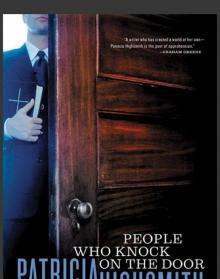 People Who Knock on the Door
People Who Knock on the Door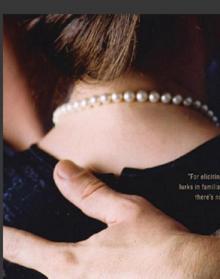 The Glass Cell
The Glass Cell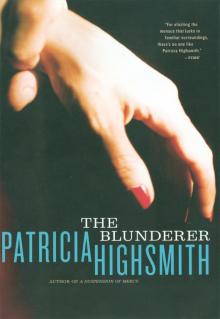 The Blunderer
The Blunderer Those Who Walk Away
Those Who Walk Away A Suspension of Mercy
A Suspension of Mercy Eleven
Eleven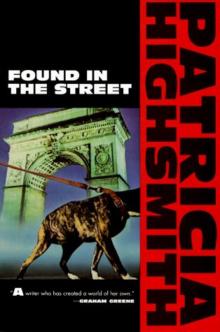 Found in the Street
Found in the Street Ripley Under Ground
Ripley Under Ground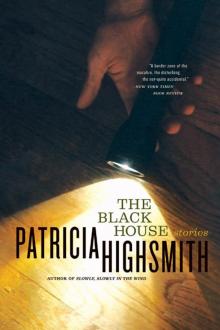 The Black House
The Black House The Cry of the Owl
The Cry of the Owl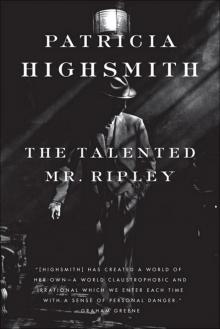 The Talented Mr. Ripley
The Talented Mr. Ripley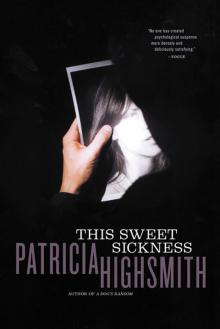 This Sweet Sickness
This Sweet Sickness The Two Faces of January
The Two Faces of January The Animal-Lover's Book of Beastly Murder
The Animal-Lover's Book of Beastly Murder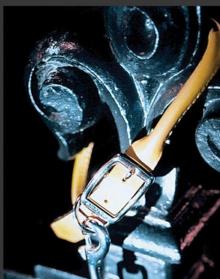 A Dog's Ransom
A Dog's Ransom Deep Water
Deep Water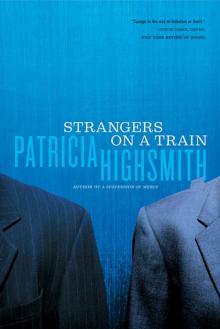 Strangers on a Train
Strangers on a Train Ripley Under Water
Ripley Under Water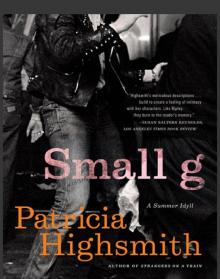 Small g
Small g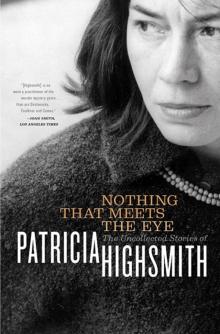 Nothing That Meets the Eye
Nothing That Meets the Eye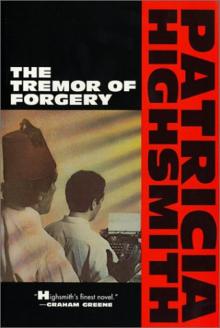 Patricia Highsmith - The Tremor of Forgery
Patricia Highsmith - The Tremor of Forgery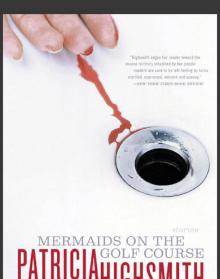 Mermaids on the Golf Course
Mermaids on the Golf Course Suspension of Mercy
Suspension of Mercy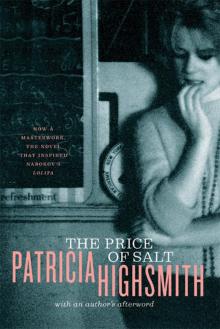 The Price of Salt, or Carol
The Price of Salt, or Carol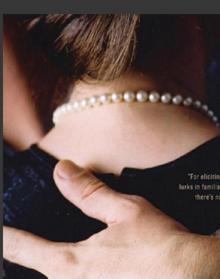 Glass Cell
Glass Cell